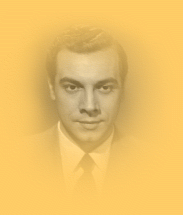
Fire in the Groin

by Derek McGovern
(Note: The following article was originally published in Lindsay Perigo's The Free Radical. I have updated it for this forum.)
Now be honest! How many of you looked at the cover of the last Free Rad and thought to yourselves: "Oh no, not Mario Lanza again! What is it with Perigo and that guy? Why does he have to keep ramming him down our throats? I mean, it's not like Lanza was a libertarian!"
Intellectually - perhaps not, but if one equates libertarianism with reaclearching for the stars, then Lanza was surely its exponent par excellence. In his singing - as in his sheer unrestrained zest for life - Lanza blazed with a passion that stunned his adoring public. Coupled with this exuberance was a tenor voice that almost defied description (but I'll give it a go): exultant, golden, dazzling, and romantic to the nth degree. Yet this "fire in the groin," as one admirer has described Lanza's musical credo, was totally at odds with the conformist America of the 1950s, and Lanza paid the ultimate price for his exuberance. Mercilessly slain by the critics for his emotive singing, hounded by the IRS, and fired by M-G-M for daring to assert his individualism, Lanza fled to Italy, where he self-destructed two years later at the age of 38.
Tragic cannot begin to describe the loss of such a talent. "Yours is a voice such is heard once in a hundred years," the great conductor Serge Koussevitsky had told his 21-year-old protege in 1942. Over six decades later, there isn't a tenor in sight with even a hint of Lanza's vocal splendour. Yet his detractors are still very much with us, whether they be the Victoria University lecturer haughtily dismissing him as "a bull in a china shop," or those pinch-faced guardians of public taste who respond to the name "Lanza" in much the same way they would to a turd on their shag pile. "Oh," they say through thin, pursed lips, "Lanza. The American. How vulgar." New Zealand's Concert FM treats him as a pariah, and it is rare indeed for any of the standard musical reference books to acknowledge he even existed.
Lanza's crime? A sense of life too vital for these anal-retentives to contemplate. During Lanza's lifetime, their comrades-in-envy were the gutter press, self-righteously condemning the tenor's bravado at every turn. Even in death, Lanza was not spared a mean-spirited obituary from Time Magazine. But then Time had always had it in for him, gleefully predicting his vocal demise from the outset and criticising his lack of sufficient humility.
Hatred of the good for being the good. Ayn Rand's words perfectly sum up the sneering attitude that one encounters towards the Lanzas of this world. It occurs at every level of society and in every artistic genre, but for this brief essay I'll restrict myself to music. Or more precisely, singers.
I'm not talking about the whining of today's pop "performers," whose reedy, off-key, vocal crimes speak volumes as to how far society has sunk in this Age of Crap. That can wait for another essay. No, it's the loss of passion in our opera singers that really bothers me. Something is horribly wrong when the majority of today's vocal talents excite the senses with all the passion of my grandmother's bread pudding. Why is the prune-faced approach to singing so tediously commonplace today? It's enough to bring Lanza back from the grave - "swearing in high C and smashing a glass against the wall," as Time tut-tutted - with one of his Vesuvian outbursts: "Let's get going! You're fracturing me with all this misery!"
Just listen to the big names of today. With very few exceptions - and I'll get to those in a minute - the last thirty years or more have been blighted by singers whose lack of passion would have been perfectly suited to the stuffy drawing rooms of nineteenth-century England. Take Luciano Pavarotti. The man's a Victoria University music lecturer's dream; he sings the notes with unerring accuracy and that's that. Emotion rarely counts for anything with him; it's as if the life force has been sucked out of him in a quest for robotic perfection. In the words of his friend Joan Sutherland - in so many ways the female equivalent of this flaccid performer - "If people want drama in their opera, they should go and see a play!" No wonder the tenor Giuseppe Di Stefano, an admirer of Lanza's and no vocal slouch himself, was moved to comment: "When I sing, I sing words. Luciano sings notes." (Italics mine.) If the man does have any real passion lurking within him, he's certainly not letting on. I can only ask: why does he even bother? No one ever emerges from a Pavarotti concert with bright eyes and goosebumps, simply blown away by the emotional depth of his singing. A macrame exhibition would engender more passion.
And it gets worse. Pavarotti's vocal successors in many respects, the tenors Roberto Alagna and Andrea Bocelli, are even blander than their idol - if such a thing is possible. Both have paler instruments - smaller, thinner and with less facility at the top than Pavarotti in his heyday. Bocelli has an attractive falsetto, and, sadly, little else. To quote the verdict of one music lover on hearing his latest CD: "No fire. No vocal performance. No nuttin' - period."
But it doesn't have to be this way, and mercifully a few have dared to be different. Jose Carreras is one of them. The truest vocal poet of his generation, he outlines his musical philosophy in his autobiography, Singing from the Soul. If I'm in the audience, he writes, "I want the singer onstage to communicate with me. I want his singing to reach all my emotions. I want to feel what he is feeling and to know what he knows. That is exactly why I'm there."
Mario Lanza expressed it similarly: "There is no word not important enough to give all your feelings to...I sing each word as though it were my last on earth."
Such "vocal individuality" is too rare, says Carreras. "We have many good singers, but most of them are unable to use their voices to show emotion and to arouse the audience's feelings." And while Carreras doesn't say so explicitly, one senses a belief that political correctness is overwhelmingly at the root of the problem.
It goes something like this: in music, just as in other spheres of life, one shouldn't "stand out" from the crowd. This view has been around since the 1950s at least, when Time Magazine would lambaste Lanza for his "unorthodox practice" of acknowledging applause "with the overhead handclasp of a prizefighter." Acknowledging one's own talent is simply not on. (If Lanza were around today, the politically correct would demand that he refrain from singing above a certain note - for fear of offending performers with lesser vocal equipment.)
But for all its malignant pervasiveness, political correctness will never succeed in muzzling every singer with a personality. In the 1960s and early 70s, soprano Anna Moffo was one whose creamy seductiveness provided the perfect antidote to the sterile Sutherland-type technicians of the day. More recently, Dmitri Hvorostovsky has been thrilling audiences everywhere with his rich baritone and compelling intensity. Hvorostovsky, a Lanza admirer, is aghast at the enormous popularity of Bocelli in the United States. To those who acclaim Bocelli as one of the great singers, he retorts, "That's like saying the best cuisine in the world is chewing gum."
Back in 1994, a fellow spectator at Jose Carreras's magnificent Auckland concert criticised the tenor for singing "too passionately." Where's the refinement? he whined. Perhaps Carreras's impassioned singing had recalled an ancient - and unsettling - thrill. Clearly he was disturbed by the unbridled display of passion on show. Harrumph! It was the old "bull in a china shop" criticism all over again.
Such critics miss the whole point of singing, and, indeed, life. But no matter; it is their loss, not mine. True, the Lanzas of this world may be rough diamonds compared to the technicians currently in vogue, but in the immortal words of Mr Perigo, "a diamond is still a diamond - no matter how rough - and a hell of a lot more interesting than a polished pebble."
Amen to that.
